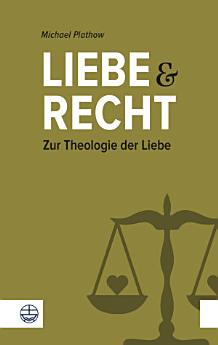Liebe und Recht: Zur Theologie der Liebe
Apr 2018 · Evangelische Verlagsanstalt
Ebook
192
Pages
family_home
Eligible
info
reportRatings and reviews aren’t verified Learn More
About this ebook
Dass "Liebe" und "Recht" miteinander zu tun haben, mag manchen verwundern. Doch schon Aristoteles zeigt uns: Das Recht braucht die Liebe zu seinem Bestand, und dort, wo Recht den Einzelfall nicht oder nicht hinreichend erfasst, tritt die Liebe – als Billigkeit, Epieikie – ergänzend zur Seite. Als konstitutiv für das Recht gilt seit Fichte, was Pannenberg in der Liebe entdeckt: die wechselseitige Anerkennung. Hier knüpft auch Wolfgang Huber an, nur differenzierter: Anerkennung ist Teil der Liebe, doch Liebe ist weit mehr als nur Anerkennung. Die materiale Ergänzung des formalen Begriffs "Anerkennung" gelingt Plathow durch Einbeziehung Max Schelers, der Liebe als intuitive Erfassung von "Werten" versteht. Werte aber begründen das Recht. So liegt die konkrete Synthese von Liebe und Recht denn im Wert. [Love and Law. On the Theology of Love] That there is a relationship between love and love may seem surprising. But already Aristotle taught: law needs love for its endurance, and when it cannot cope with the single case, love stands by additionally – as epikie, equity. What since Fichte is considered constitutive for law, Pannenberg discovers also in love: mutual recognition. Here Wolfgang Huber ties in – more differentiated: recognition is part of love, but love is far more than just recognition. With regard to the material complementation to this formal concept, Plathow refers to Max Scheler, who sees love as an organ of knowledge, more precisely: as an organ of intuitive knowledge of "values". And values are the basis of law. Thus, the concrete synthesis of love and law is to be found in the concept of value.
About the author
Michael Plathow, Dr. theol., Jahrgang 1943, studierte Theologie und Jura. Nach Promotion, Ordination und Habilitation war er von 1972 bis 1982 Studienleiter des Ökumenischen Instituts der Universität Heidelberg, von 1982 bis 2001 Pfarrer in Heidelberg. Seit 1986 hat er eine apl. Professur für Systematische Theologie an der Ruprecht-Karls-Universität Heidelberg inne. Von 2001 bis 2007 war er Direktor des Konfessionskundlichen Instituts in Bensheim. Seit seiner Pensionierung 2008 lehrt er weiterhin an der Ruprecht-Karls-Universität. Seine Forschungsschwerpunkte sind Dogmatik, Kirchenrecht und die Theologie Martin Luthers.
Rate this ebook
Tell us what you think.
Reading information
Smartphones and tablets
Install the Google Play Books app for Android and iPad/iPhone. It syncs automatically with your account and allows you to read online or offline wherever you are.
Laptops and computers
You can listen to audiobooks purchased on Google Play using your computer's web browser.
eReaders and other devices
To read on e-ink devices like Kobo eReaders, you'll need to download a file and transfer it to your device. Follow the detailed Help Center instructions to transfer the files to supported eReaders.






